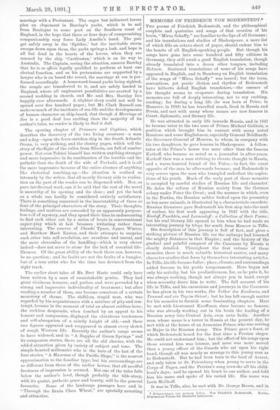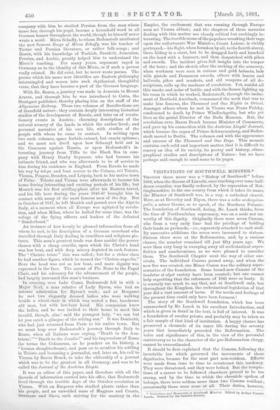MEMOIRS OF FRIEDRICH VON BODENSTEDT.* THE poems of Friedrich Bodenstedt,
and the philosophical couplets and quatrains and songs of that creation of his brain, "Mirza Schaffy," are familiar to the lips of all Germans ; and his translations and studies of Shakespeare, a mere list of which fills an octavo sheet of paper, should endear him to the hearts of all English-speaking people. But though his songs have gone into some hundred and fifty editions in Germany, they still await a good English translation, though already translated into a dozen other tongues, including Hebrew. Scattered translations of some of his songs have appeared in English, and in Hamburg an English translation of the songs of "Mirza Schaffy" was issued; but the terse, sententious, yet poetic diction and rhythm of Bodenstedt have hitherto defied English translators,—the essence of his thought seems to evaporate during translation. His memoirs are full of deeply interesting, not to say exciting, reading; for during a long life (he was born at Peine, in Hanover, in 7819) he has travelled much, lived in Russia and Persia, and met with many whose names are now famous in Court, diplomatic, and literary life.
He was attracted in early life towards Russia, and in 1841 he became tutor to the two sons of Prince Michael Galitzin, position which brought him in contact with many noted Russians and some Englishmen, especially General Neidhardt, the Governor-General of Moscow, to whom, in company with his two daughters, he gave lessons in Shakespeare. A fellow- tutor at the Prince's house was none other than the famous Katkoff, who became so noted as a journalist in after-years. Katkoff then was a man striving to elevate thought in Russia, and a warm-hearted friend of the Poles, in fact, the exact opposite of the man he afterwards became; and Bodenstedt is very severe upon the man who trampled underfoot the aspira- tions of his youth. Much of the early part of these memoirs is occupied by careful studies of Russian life and character. He dates the reform of Russian society from the German colony under Peter the Great; and the manner in which, even in the Forties, the Russian nobles looked upon the peasantry as but mere animals, is illustrated by a characteristic anecdote. Russian literature gave Bodenstedt his first step into the rank of author, his first work appearing in 1843 with the title, Ire:slog Puschkin, and Lermontoff : a Collection of their Poems ; but his real literary life opened to him when he had made an interesting journey by telega far south from Moscow to Tiflis.
His description of this journey is full of fact, and gives a striking picture of Russian life ere the railways had lessened the mighty distances in that Empire ; and the history of the gradual and painful conquest of the Caucasus by Russia is clearly detailed. Throughout the first volume of these memoirs, there is much valuable historical matter, and many character-studies that form by themselves interesting articles. In Tiflis, his life became fuller; place, climate, and surroundings added fervour to his poetic temperament. Here began not only his activity, but his productiveness, for, as he puts it, he was always working, though not always pen in hand, except when necessity drove him to write. The full account of his life in Tiflis; and his excursions and journeys in the Caucasus, he has given in his two works, Die Volker des Kaukasus, and Tausend and ern Tag im Orient; but he has left enough matter for his memoirs to furnish some fascinating chapters. Here he met with Lieutenant Kauffman, since become so famous, who was already working out in his brain the leading of a Russian army into Central Asia, even unto India. Another man, whose name is a terror in Russia at the present clay, he met with at the house of an Armenian Prince, who was serving as Major in the Russian Army. This Prince gave a feast, at which Bodenstedt heard for the first time a Persian singer. He could not understand him ; but the effect of his songs upon those around him was intense, and none was more moved than a young officer of the Guards who sat upon his right hand, though all was nearly as strange to this young man as to Bodenstedt. But he had been born in the land of Ararat, and only taken to St. Petersburg when young to serve in the Corps of Pages, and the Persian's song reawoke all his child- hood's days ; and he opened his heart to our author, and told him his name and spoke of his varied life. His name was Loris Melikoff.
It was in Tiflis, also, he met with Dr. George Rosen, and in
• Brinuorwaoan aus mauve. Leber. Von Friedrich Badonstedt. Berlin AUgemeinor Vorein fur Deutsche Litteratur, company with him he studied Persian from the man whose name has, through his pupil, become a household word in all German homes throughout the world, though he himself never wrote a word. Mirza Schaffy, to whom Bodenstedt attributed the now famous Songs of .Mirza Sehaffy, was his teacher of Tartar and Persian literature, or rather folk-songs ; and Rosen, with his knowledge of Turkish, Sanskrit, Armenian, Persian, and Arabic, greatly helped him to understand the Mirza's teaching. For many years, argument raged in Germany as to the identity of this Mirza, or if such a person really existed. He did exist, but he never wrote poems. The poems which his name now identifies are Eastern philosophy intermingled and woven into such rhythmical, thoughtful verse, that they have become a part of the German language.
With Dr. Rosen, a journey was made in Armenia to Mount Ararat, and through him he was introduced to Cotta, the Stuttgart publisher, thereby placing him on the staff of the Allgenzeine Zeitung. These two volumes of Recollections are of threefold nature : they contain deeply interesting historical studies of the development of Russia, and later on of revolu- tionary events in Austria ; charming descriptions of the natural scenery of the lands in which the author lived ; and personal narrative of his own life, with studies of the people with whom he came in contact. In writing upon two such volumes, space forbids extract, but exacts epitome ; and we must not dwell upon how Schamyl held out in the Caucasus against Russia, or upon Bodenstedt's in- teresting journey from Tiflis to the Black Sea in com- pany with Henry Danby Seymour, who bad become his intimate friend, and who was afterwards to be of service to him during his residence in England. From Russia he made his way by telega and boat across to the Crimea, vii Trieste, Vienna, Prague, Dresden, and Leipzig, back to his native town of Peine. Trieste and Vienna were afterwards to become his home during interesting and exciting periods of his life; but Munich was his first settling-place after his Eastern travel, and his life here during the years 1846-47 brought him in contact with many of the most famous men of the day. But in October of 1847, he left Munich and passed over the Alps to Italy, at a moment when all Europe was agitated by revolu- tion, and when Milan, where he halted for some time, was the refuge of the flying officers and leaders of the defeated " Sonderbund."
An instance of how keenly he gleaned information from all whom he met, is his description of a German merchant who travelled through Italy dealing in crucifixes and religious pic- tures. This man's greatest trade was done amidst the poorer classes with a cheap crucifix, upon which the Christ's head was low bent, and with deep misery depicted in each feature. The " Christ° tristo" this was called ; but for a richer class he had another figure, which he named the " Christ° superbo." Here the head was not so low bent, and more dignity was expressed in the face. The ascent of Pio None to the Papal Chair, and his advocacy for the advancement of the people, had largely increased this man's business.
In crossing over Lake Como, Bodenstedt fell in with a Major Nobl, a near relative of Lady Byron, who had an intense admiration for Byron's work ; and at Bergamo he met two elegantly dressed ladies who were walking beside a wheel-chair in which was seated a fine, handsome old man, but with low-bent head. His companion knew the ladies, and he was invited to their house to meet this invalid, though, alas ! said the youngest lady, " we can but let you catch a glimpse of the setting sun." It was Donizetti, who had just returned from Paris to his native town. But we must leap over Bodenstedt's journey through Italy to Rome, when all Italians were crying, "Death to the Aus- trians !" " Death to the Jesuits !" and his impressions of Rome (he terms the Colosseum, as he ponders on its history, a "human slaughterhouse), and pass on to mention his settling in Trieste and becoming a journalist, and, later on, his call to Vienna by Baron Bruck, to take the editorship of a journal which was to be the greatest in all Germany, and was to be called the Journal of the Austrian Lloyds.
It was as editor of this paper, and therefore with all the threads of information carried into his office, that Bodenstedt lived through the terrible days of the October revolution in Vienna. With an Emperor who studied plants rather than his people, and an unwelded mass of Magyars and Croats, Germans and Slays, each striving for the mastery in the Empire, the excitement that was running through Europe soon set Vienna ablaze; and the chapters of these memoirs dealing with this matter are closely critical but excitingly in- teresting. The terrible scone of the populace wreaking their rage upon the unfortunate War Minister, Count Latour, is vividly portrayed,—his flight, when forsaken by all, to the fourth storey, there hiding in a chest, but to be dragged forth and knocked on the head with a hammer, and then despatched with pikes and swords. The incident gives full insight into the temper of the hour; and the sketch after the sacking of the armoury, when workmen were seen in cuirass and gold helmets, lads with pistols and Damascus swords, others with lances and halberds, pikes and muskets, and old weapons of all de- scriptions, calls up the madness of revolution. Yet, amidst all this smoke and noise of battle, and with the flames lighting up his room in which he worked, Bodenstedt, through the incite- ment of Berthold Auerbach, commenced the work that was to make him famous, the Thousand and One Nights in Orient. Amongst others whom he met in Vienna was Franz Pulsky, condemned to death by Prince Windischgriitz, but who yet lives as the genial Director of the Buda Museum. But, the revolution over, Baron Bruck became Minister of Commerce, and gave up his connection with the Austrian Lloyds' Journal, which became the organ of Prince Schwarzenberg, and Boden- stedt moved to Berlin. The volumes end with the appearance and success of the Thousand and One Days. This memoir contains such solid and important matter, that it is difficult to convey an idea of its variety, its poetry and history, ethno- graphical studies and descriptions of Nature : but we have. perhaps said enough to send some to its pages.



































 Previous page
Previous page